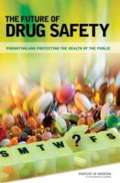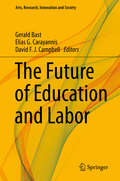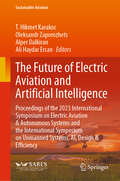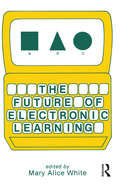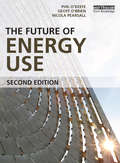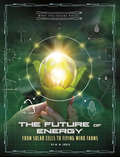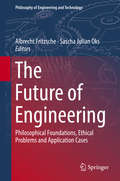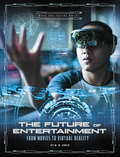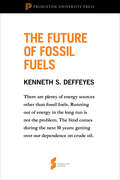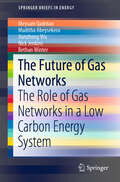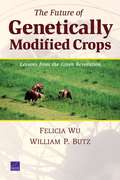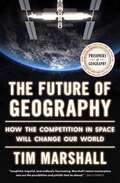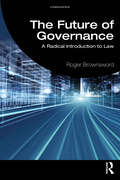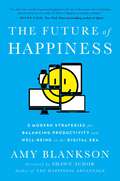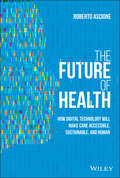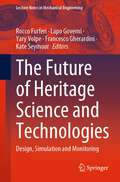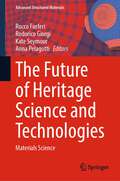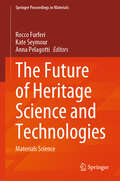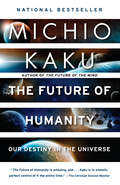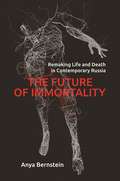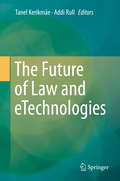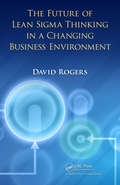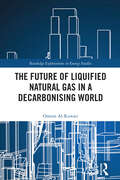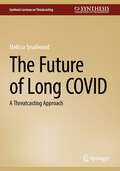- Table View
- List View
The Future of Drug Safety: Promoting and Protecting the Health of the Public
by Institute of Medicine of the National AcademiesIn the wake of publicity and congressional attention to drug safety issues, the Food and Drug Administration (FDA) requested the Institute of Medicine assess the drug safety system. The committee reported that a lack of clear regulatory authority, chronic underfunding, organizational problems, and a scarcity of post-approval data about drug's risks and benefits have hampered the FDA's ability to evaluate and address the safety of prescription drugs after they have reached the market. Noting that resources and therefore efforts to monitor medication's risk-benefit profiles taper off after approval, The Future of Drug Safety offers a broad set of recommendations to ensure that consideration of safety extends from before product approval through the entire time the product is marketed and used.
The Future of Education and Labor (Arts, Research, Innovation and Society)
by Elias G. Carayannis David F. J. Campbell Gerald BastThis book explores the ways in which education impacts labor markets. Specifically, the contributions in this book indicate that the future of labor is creative, socially aware and inter-disciplinary while identifying the changes and innovations needed in our educational systems to meet this demand.Due to an increasing automatization (robotic manufacturing), the character of labor and work in general will change dramatically in the near future. This will be the case not only in the western countries, but also in the larger emerging economies in Asia, for example China and India. While societal environments, economy and the character of labor are increasingly in a process of dramatic changes, the educational systems and the leading principles of research about labor and employment are not changing adequately. Cross-disciplinary (inter-disciplinary and trans-disciplinary) thinking and learning is not the main focus of our educational systems. Consequently, the systems of academic research follow and apply disciplinary or even sub-disciplinary strategies, avoiding cross-disciplinary research approaches, and not supporting inter-disciplinary academic career models. This book introduces such strategic models to better prepare the next generation of workers for the new knowledge economy, and the future of democratic societies.
The Future of Electric Aviation and Artificial Intelligence: Proceedings of the 2023 International Symposium on Electric Aviation & Autonomous Systems and the International Symposium on Unmanned Systems, AI, Design & Efficiency (Sustainable Aviation)
by T. Hikmet Karakoc Alper Dalkiran Oleksandr Zaporozhets Ali Haydar ErcanThe Future of Electric Aviation and Artificial Intelligence presents a unique collection of proceedings papers from two multi-disciplinary symposiums on sustainable aviation and unmanned systems, offering a comprehensive view of the latest research and insights. The International Symposium on Electric Aviation and Autonomous Systems (ISEAS 2023) presents aerospace, autonomous, and piloted unmanned systems research. The International Symposium on Unmanned Systems, AI, Design & Efficiency (ISUDEF 2023) gathers researchers, scientists, engineers, practitioners, policymakers, and students working on topics in the unmanned systems industry and artificial intelligence (AI). The collected papers provide insights on a broad range of current issues in aviation, including hybrid, electric, all-electric, and fuel cell aerial vehicles, electric generation, energy storage, propulsion technology, design issues, AI applications, efficient operations, and new identification and detection systems that adapt to the latest technology standards. ISEAS 2023 and ISUDEF 2023 allow researchers, scientists, engineers, practitioners, policymakers, and students to exchange information and professionals to present new technologies and developments and discuss future direction, strategies, and priorities in aviation and sustainability.
The Future of Electricity Demand
by Tooraj Jamasb Michael G. PollittWhat will electricity and heat demand look like in a low-carbon world? Ambitious environmental targets will modify the shape of the electricity sector in the twenty-first century. 'Smart' technologies and demand-side management will be some of the key features of the future of electricity systems in a low-carbon world. Meanwhile, the social and behavioural dimensions will complement and interact with new technologies and policies. Electricity demand in the future will increasingly be tied up with the demand for heat and for transport. The Future of Electricity Demand looks into the features of the future electricity demand in light of the challenges posed by climate change. Written by a team of leading academics and industry experts, the book investigates the economics, technology, social aspects, and policies and regulations which are likely to characterize energy demand in a low-carbon world. It provides a comprehensive and analytical perspective on the future of electricity demand.
The Future of Electronic Learning
by Mary Alice WhiteFirst Published in 1983. Routledge is an imprint of Taylor & Francis, an informa company.
The Future of Energy Use
by Geoff O'Brien Nicola Pearsall Phil O'KeefeFollowing the success of its predecessor, this second edition of The Future of Energy Use provides essential analysis of the use of different forms of energy and their environmental and social impacts. It examines conventional, nuclear and renewable sources and technologies, using relevant case studies and providing a vital link between technology and related policy issues. The new edition has been comprehensively developed and updated, including new text, diagrams and tables, with entire new sections that reflect the significant changes that have occurred since the first edition. New material includes: a stronger focus on climate change policy and energy security; a discussion of the long run marginal costs of oil; coverage of the biofuels debate in both the developed and developing worlds; an outline of developments in the built environment (including transport issues); and the relationship between behaviour and energy use. It reviews policy shifts with relation to energy efficiency, carbon capture and storage, combined heat and power, and combined cycle gas turbines. There is new coverage of nuclear waste, storage and proliferation, and new material on microgeneration and biofuels, as well as essential new information on carbon markets and the hydrogen economy. The result is a unique introduction and guide to all the vital issues within energy for students, academics and professionals new to the field.
The Future of Energy: From Solar Cells to Flying Wind Farms (What the Future Holds)
by M. M. EbochOur world runs on energy! But traditional fossil fuels are doing great damage to the environment, and they will eventually run out. How might solar, water, wind and geothermal power come to our rescue? Readers can discover how different the world could look in the future with energy sources that are clean and renewable.
The Future of Engineering: Philosophical Foundations, Ethical Problems and Application Cases (Philosophy of Engineering and Technology #31)
by Albrecht Fritzsche Sascha Julian OksIn a world permeated by digital technology, engineering is involved in every aspect of human life. Engineers address a wider range of design problems than ever before, raising new questions and challenges regarding their work, as boundaries between engineering, management, politics, education and art disappear in the face of comprehensive socio-technical systems. It is therefore necessary to review our understanding of engineering practice, expertise and responsibility.This book advances the idea that the future of engineering will not be driven by a static view of a closed discipline, but rather will result from a continuous dialogue between different stakeholders involved in the design and application of technical artefacts. Based on papers presented at the 2016 conference of the forum for Philosophy, Engineering and Technology (fPET) in Nuremberg, Germany, the book features contributions by philosophers, engineers and managers from academia and industry, who discuss current and upcoming issues in engineering from a wide variety of different perspectives. They cover topics such as problem solving strategies and value-sensitive design, experimentation and simulation, engineering knowledge and education, interdisciplinary collaboration, sustainability, risk and privacy.The different contributions in combination draw a comprehensive picture of efforts worldwide to come to terms with engineering, its foundations in philosophy, the ethical problems it causes, and its effect on the ongoing development of society.
The Future of Entertainment: From Movies to Virtual Reality (What the Future Holds)
by M. M. EbochFrom stage productions to television to movies, humans have always been entertained by a good story. But how might entertainment change in the future? From immersive virtual reality games to social media with 3-D holograms, readers can find out what cool new technologies might change the way they are entertained.
The Future of Fossil Fuels: From Hubbert's Peak (Princeton Shorts #4)
by Kenneth S. DeffeyesAs debates about the effects of fossil fuels on our climate and foreign policy intensify, the question of just how much longer we can depend on this finite source of energy becomes more and more pressing. This selection from Hubbert's Peak, the leading book on the limits of our oil supply, forecasts what the future will bring for fossil fuels and what the alternatives are likely to be. Princeton Shorts are brief selections excerpted from influential Princeton University Press publications produced exclusively in eBook format. They are selected with the firm belief that while the original work remains an important and enduring product, sometimes we can all benefit from a quick take on a topic worthy of a longer book. In a world where every second counts, how better to stay up-to speed on current events and digest the kernels of wisdom found in the great works of the past? Princeton Shorts enables you to be an instant expert in a world where information is everywhere but quality is at a premium. The Future of Fossil Fuels does just that.
The Future of Gas Networks: The Role of Gas Networks in a Low Carbon Energy System (SpringerBriefs in Energy)
by Nick Jenkins Jianzhong Wu Meysam Qadrdan Muditha Abeysekera Bethan WinterThis book investigates the role of gas networks in future low-carbon energy systems, and discusses various decarbonisation pathways, providing insights for gas network operators, developers, and policy makers. As more countries around the world move towards low-carbon energy systems and increase their exploitation of renewable energy sources, the use of natural gas and the associated infrastructure is expected to undergo a substantial transformation. As such there is a great uncertainty regarding the future role of gas networks and how they will be operated in coming years.The topics addressed include:Fundamentals of gas network operationThe impact of variable renewable electricity generation on the operation and expansion of gas networksThe impact of decarbonising heat supplies on gas networksOpportunities and challenges of utilising gas networks to transport alternative low-carbon gases such as bio-methane and hydrogen
The Future of Genetically Modified Crops
by William Butz Felicia WuThe world is now on the cusp of a new agricultural revolution, the so-called Gene Revolution, in which genetically modified (GM) crops are tailored to address chronic agricultural problems in certain regions of the world. This monograph report investigates the circumstances and processes that can induce and sustain this new agricultural revolution. The authors compare the Green Revolution of the 20th century with the GM crop movement to assess the agricultural, technological, sociological, and political differences between the two movements.
The Future of Geography: How the Competition in Space Will Change Our World (Politics of Place #4)
by Tim MarshallFrom the New York Times bestselling author of Prisoners of Geography and leading geopolitics expert comes an &“insightful, hopeful, and endlessly fascinating&” (Daily Express) book on today&’s space race—including the increasingly tense power struggle between the US, China, and Russia and what it means for all of us here on Earth.Spy satellites orbiting the moon. Space metals worth more than most countries&’ GDP. People on Mars within the next ten years. This isn&’t science fiction—it&’s reality. Humans are venturing up and out, and we&’re taking our competitive spirit with us. Soon, what happens in space will shape human history as much the mountains, rivers, and seas have impacted civilizations around the world. It&’s no coincidence that Russia, China, and the USA are leading the way. The next fifty years will change the face of global politics and the world order as we know it. In this must-read work, bestselling author Tim Marshall navigates the new astropolitical reality to show how we got here and where we&’re heading. Extensively researched, &“thought-provoking&” (Popular Science), and drawing on the latest information from intelligence, government, and civilian institutions, this book provides a detailed, clear account of the new space race, the power rivalries, and how technology, economics, and war have a ripple effect on everyone across the globe. Written with all the insight and wit that have made Marshall one of the world&’s most popular and trusted writer on geopolitics, The Future of Geography is an essential read about global power, politics, and the future of humanity.
The Future of Governance: A Radical Introduction to Law
by Roger BrownswordThis book offers a radically different introduction to law, one that reflects the challenges and opportunities presented by the rapid technological developments of our time.Traditionally, law has been about historic principles and rules and their application to a particular set of facts; and courts, judges, and disputes have been central to the legal enterprise. Against this approach, this book highlights four radical and revisionist ideas: by bringing modern technologies into the foreground; by presenting law as one particular mode of governance in a larger picture of governance that now includes technological modalities; by insisting that we have to think outside the traditional doctrinal box to engage with a broad range of governance questions; and by emphasising that human communities cannot flourish without good governance to which both lawyers and law are central. These four radical threads are woven into a discussion of the modern landscape of law, and together they offer a distinctly contemporary contribution to the quest for good governance. The challenge for lawyers now, the book maintains, is to contribute to thinking, both locally and globally, about how we take advantage of the opportunities presented by the newest technology, without compromising the essential conditions for human life and co-existence, and without losing what we value in law’s governance.This book is aimed at students who are studying law at university and legal academics, and others, interested in the current and future impact of technology on law.
The Future of Happiness: 5 Modern Strategies for Balancing Productivity and Well-Being in the Digital Era
by Amy BlanksonTechnology, at least in theory, is improving our productivity, efficiency, and communication. The one thing it's not doing is making us happier. We are experiencing historically high levels of depression and dissatisfaction. But we can change that. Knowing that technology is here to stay and will continue to evolve in form and function, we need to know how to navigate the future to achieve a better balance between technology, productivity, and well-being. Technology can drive—not diminish—human happiness. In The Future of Happiness, author Amy Blankson, cofounder of the global positive psychology consulting firm GoodThink, unveils five strategies successful individuals can use, not just to survive—but actually thrive—in the Digital Age: Stay Grounded to focus your energy and increase productivity Know Thyself through app-driven data to strive toward your potential Train Your Brain to develop and sustain an optimistic mindset Create a Habitat for Happiness to maximize the spaces where you live, work, and learn Be a Conscious Innovator to help make the world a better place By rethinking when, where, why, and how you use technology, you will not only influence your own well-being but also help shape the future of your community. Discover how technologies can transform the idea of "I'll be happy when . . ." to being happy now.
The Future of Health: How Digital Technology Will Make Care Accessible, Sustainable, and Human
by Roberto AscioneLearn how the future of medicine is being unlocked—one digital innovation at a time The Future of Health is an insightful and comprehensive overview of the past, present, and future of digital health. Accomplished health innovation leader Roberto Ascione delivers a practical exploration of how the latest digital technologies are transforming the practice of medicine and redefining health itself by making it more accessible, sustainable, and human. The book includes practical, real-world examples from the United States, Asia, and Europe of technology applications, companies, and start-up that have changed—or will change—our relationship with our health and the healthcare system. Readers will also find: How our health is becoming increasingly consumer and connected while technology is empowering patients in completely new ways and deeply transforming the doctor-patient relationship Discussions of how the training of medical professionals, particularly doctors, has changed—or needs to change—to meet the new digital reality Examinations of how new technologies will allow doctors to dodge many of the administrative and regulatory burdens they currently face each day Treatments of the ability of new technologies to unlock new, holistic ways of practicing medicine, with a focus on latest developments such as Digital Therapeutics and Virtual Reality Reflections on how digital health is fostering a shift “from cure to care” and will unleash a human-sized future for a more accessible, ubiquitous, and sustainable healthcare The Future of Health is required reading for medical practitioners and the managers of pharmaceutical companies. It will also earn a place in the libraries of medical device companies and healthcare entrepreneurs seeking an incisive treatment of the impact of digital technology on all aspects of healthcare. Also, the general public, interested in understanding how to take better control of their own health through digital technologies, will find this book insightful and easy to comprehend.
The Future of Heritage Science and Technologies: Design, Simulation and Monitoring (Lecture Notes in Mechanical Engineering)
by Francesco Gherardini Rocco Furferi Lapo Governi Yary Volpe Kate SeymourThis book gathers a selection of contributions dealing with the application of mechanical engineering for preserving and managing cultural heritage. It covers advanced techniques for 3D survey, modeling and simulation, reconstruction, data management as well as advanced diagnostics and testing methods. It highlights strategies to foster sustainability, inclusivity, energy saving and waste reuse in preventive conservation of historical buildings and sculptures, and large heritage sites. Based on contributions presented at the 3rd Florence Heri-Tech International Conference, held on May, 16-18, 2022, in Firenze, Italy, this book offers a timely source of information concerning engineering methods in heritage for both researchers and professionals in the field.
The Future of Heritage Science and Technologies: Materials Science (Advanced Structured Materials #179)
by Rodorico Giorgi Rocco Furferi Kate Seymour Anna PelagottiThis book presents selected work from the Florence Heri-Tech, a conference focused on the use of innovative technologies and methods for analyzing, managing, and preserving cultural heritage. This book presents chapters on the chemical and physical advancement in the development of new materials and methods for the conservation and restoration of cultural heritage. It also covers trends in conservation and restoration technology: biotechnology, nanotechnology, tailored materials, and physical technologies. The reader also finds information on methods and instruments for the conservation diagnosis and treatments.
The Future of Heritage Science and Technologies: Materials Science (Springer Proceedings in Materials #70)
by Rocco Furferi Kate Seymour Anna PelagottiThis book features selected contributions from Florence Heri-Tech 2024, showcasing cutting-edge technologies for the analysis, conservation, and restoration of cultural heritage. It explores advancements in materials science, including nanotechnology and plasma-based restoration, as well as innovative diagnostic methods. The book provides insights into biotechnology, tailored materials, and novel physical techniques, offering a comprehensive overview of emerging trends in heritage preservation.
The Future of Humanity: Terraforming Mars, Interstellar Travel, Immortality, and Our Destiny Beyond Earth
by Michio Kaku<P> The #1 bestselling author of The Future of the Mind traverses the frontiers of astrophysics, artificial intelligence, and technology to offer a stunning vision of man's future in space, from settling Mars to traveling to distant galaxies. <P> Formerly the domain of fiction, moving human civilization to the stars is increasingly becoming a scientific possibility--and a necessity. Whether in the near future due to climate change and the depletion of finite resources, or in the distant future due to catastrophic cosmological events, we must face the reality that humans will one day need to leave planet Earth to survive as a species. <P> World-renowned physicist and futurist Michio Kaku explores in rich, intimate detail the process by which humanity may gradually move away from the planet and develop a sustainable civilization in outer space. He reveals how cutting-edge developments in robotics, nanotechnology, and biotechnology may allow us to terraform and build habitable cities on Mars. He then takes us beyond the solar system to nearby stars, which may soon be reached by nanoships traveling on laser beams at near the speed of light. Finally, he brings us beyond our galaxy, and even beyond our universe, to the possibility of immortality, showing us how humans may someday be able to leave our bodies entirely and laser port to new havens in space. <P>With irrepressible enthusiasm and wonder, Dr. Kaku takes readers on a fascinating journey to a future in which humanity may finally fulfill its long-awaited destiny among the stars. <P><b> A New York Times Bestseller</b>
The Future of Immortality: Remaking Life and Death in Contemporary Russia (Princeton Studies in Culture and Technology #23)
by Anya BernsteinA gripping account of the Russian visionaries who are pursuing human immortalityAs long as we have known death, we have dreamed of life without end. In The Future of Immortality, Anya Bernstein explores the contemporary Russian communities of visionaries and utopians who are pressing at the very limits of the human.The Future of Immortality profiles a diverse cast of characters, from the owners of a small cryonics outfit to scientists inaugurating the field of biogerontology, from grassroots neurotech enthusiasts to believers in the Cosmist ideas of the Russian Orthodox thinker Nikolai Fedorov. Bernstein puts their debates and polemics in the context of a long history of immortalist thought in Russia, with global implications that reach to Silicon Valley and beyond. If aging is a curable disease, do we have a moral obligation to end the suffering it causes? Could immortality be the foundation of a truly liberated utopian society extending beyond the confines of the earth—something that Russians, historically, have pondered more than most? If life without end requires radical genetic modification or separating consciousness from our biological selves, how does that affect what it means to be human?As vividly written as any novel, The Future of Immortality is a fascinating account of techno-scientific and religious futurism—and the ways in which it hopes to transform our very being.
The Future of Law and eTechnologies
by Tanel Kerikmäe Addi RullThis book presents groundbreaking discussions on e-residency,cryptocurrencies, scams, smart contracts, 3D printing, software agents, digitalevidence and e-governance at the intersection of law, legal policies and moderntechnologies. The reader benefits from cutting-edge analyses that offer ideasand solutions to some of the most pressing issues caused by e-technologies. This collection is a useful tool for law and IT practitioners and aninspiring source for interdisciplinary research. Besides serving as a practicalguideline, this book also reflects theoretical dimensions of futureperspectives, as new technologies are not meant to change common values but toaccommodate them.
The Future of Lean Sigma Thinking in a Changing Business Environment
by David RogersOf the 100 companies named to Fortune magazine’s list of the world’s largest companies in 1956, only 29 of those companies remain on that list. Many lost their way because they failed to recognize the changes taking place, or were too big to react quickly enough to shifting market conditions. Supplying Lean practitioners with a formal process for keeping up with technological advancements and shifting business requirements, The Future of Lean Sigma Thinking in a Changing Business Environment provides the tools to survive and prosper through the current business environment. It introduces cutting-edge business solutions from the fields of chemical engineering, aircraft production, and business psychology, and explains how to integrate these concepts with proven Lean principles. The book begins by providing a foundation in essential Lean concepts, including Deming and Juran, Six Sigma, Total Quality Management, the Toyota Production System, and New Six Sigma. Next, it reports on the latest advances in process understanding. By analyzing changing attitudes within the system, it illustrates how new products are being developed using updated Lean thinking. In addition, it provides examples that demonstrate the impact of e-commerce on Lean production systems. Incorporating the green agenda to Lean thinking, the text supplies the insight to safely navigate your company through a shifting business landscape while reducing your impact on raw materials and the environment. By following the principles discussed in this book, you will not only increase your company’s chances of achieving long-term survival but will position your organization to capitalize on the economic upturn on the horizon.
The Future of Liquified Natural Gas in a Decarbonising World (Routledge Explorations in Energy Studies)
by Omran Al-KuwariThis book analyses the role of liquified natural gas in a decarbonising world and presents the most significant energy-transition options and implications for the liquified natural gas industry.Major investments and developments in technology have been made in recent years in an attempt to meet global demand, but energy systems require radical new pathways to meet climate goals in line with the Paris Agreement. This book explores the role of liquified natural gas in the context of the global energy transition, arguing that liquified natural gas has a role to play in terms of resources, the gas market, energy-transition dynamics/regime status, and geopolitical powers. Using a bespoke meta-framework grounded in institutional theory and case studies, the book examines how institutional, political, and resource characteristics affect liquified natural gas use. The book also explores implications for liquified natural gas exporters in the context of the energy transition and analyses the characteristics of liquified natural gas compared with pipeline gas. The multiple case study approach examines the role of natural gas in Japan, the UK, and China, three countries in different stages of the energy transition, to determine potential pathways for exporters. Utilising a multi-method procedure for data collection, including data analysis, in-depth interviews, and direct observations, the book concludes with findings on the potential role of liquified natural gas in various future stages of the energy transition.Written by an industry expert, this book will be of value to students, researchers, and academics interested in energy studies, decarbonisation studies, and environmental studies more broadly.
The Future of Long COVID: A Threatcasting Approach (Synthesis Lectures on Threatcasting)
by Melissa SmallwoodThis book provides an overview of Long COVID, the chronic illness and disability that can result from COVID-19 infection in 20–30% of survivors. It approaches the topic through its larger social, political, and historical context utilizing the Threatcasting methodology for scenario-based foresight. The book brings together multiple perspectives on Long COVID, such as patient experiences, healthcare system impacts, historical frameworks, and the information ecosystem surrounding COVID to explore the long-term structural implications of Long COVID beyond the current acute crisis. It is intended to be a guide for policy makers, healthcare providers, researchers, and anyone whose work will play a role in mitigating the long tail of COVID-19. Framing the pandemic within a historical and political framework while approaching Long COVID from the future-casting perspective, this book seeks to disentangle the issues posed by Long COVID from the current moment and is intended to establish new ways of thinking about and preparing for similar complex, over-the-horizon potential threats. The first book to apply the Threatcasting framework to a public-health issue like COVID-19Draws together multiple perspectives of Long COVID that were previously discussed independently within their fieldsComprehensively examines the history and future of Long COVID
